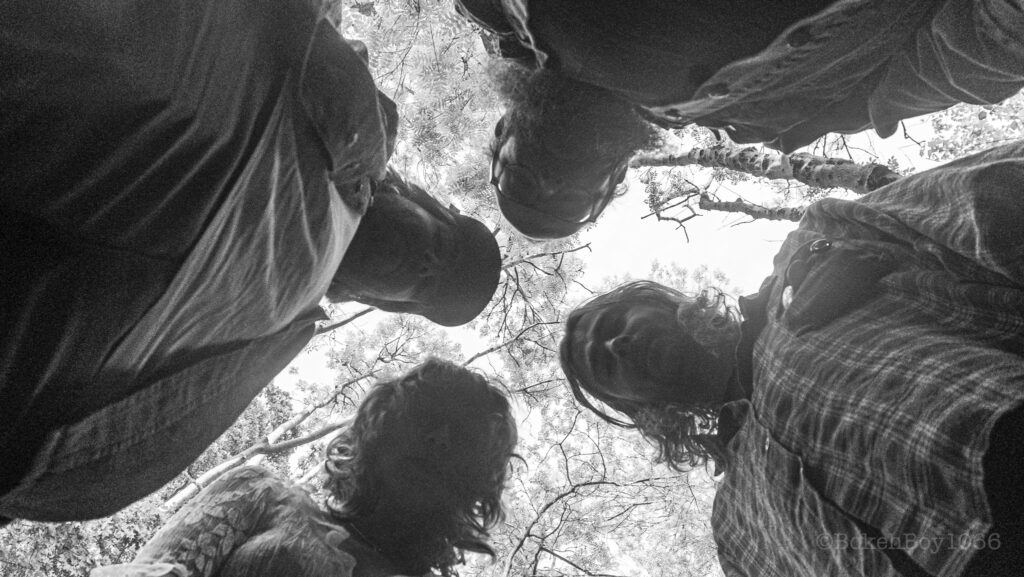When Al Mitchell sat down with a guitar in 2024, he wasn’t chasing an album or a comeback. He wasn’t even sure if he wanted to make music anymore. What he found instead was a song that cracked open a new chapter of his life. “When the Winds Came,” Woodpig’s debut single, is less a launchpad than a lifeline: a piece of music born in grief and solitude, reshaped through friendship, and now released into the world with the quiet confidence of something deeply lived in.
“I had fallen out of love with the idea of putting music out,” Mitchell tells AVOLA. “I decided to call it a day with my previous project and took some time away. I realised that perhaps I was doing it for the wrong reasons. This time away from music also coincided with huge changes in my personal life. Perhaps I needed a hard reset.”

That reset came during a year defined by loss. A family member passed, a long-term relationship ended, and Mitchell found himself drifting. Long walks became rituals of mourning and repair. One day, guitar in hand, he wrote “When the Winds Came.” It arrived quickly, with the urgency of something that had been waiting to be said. “Immediately it felt exciting again, and more importantly, it felt right for me,” he says. “It was the first time in a long time that I felt motivated, and it was something I was deeply proud of from the start.”
The track became the seed of an entire album’s worth of songs, all written in a burst over three months. Each piece wrestled with endings, but together they pointed toward renewal. Mitchell called the project Woodpig, a name that to him symbolises rebirth.
Woodpig began as a solitary endeavor, its earliest demos skeletal and raw: guitar, voice, and little else. But an invitation to play a show from drummer and longtime friend Josh Gentle shifted everything. “I wanted to play a show my friend Josh was putting on, and he said the night would flow better if I had a band around it,” Mitchell recalls. “Desperate to play with my newfound joy for music, I rounded up my friends—Josh being one of them. Harrison, Josh, and Mol are all songwriters in their own right. They understood the depth behind the songs and wrote their parts to serve the tunes.”
The lineup fell into place almost by accident. Bassist Harrison Caruana was already Mitchell’s housemate, the kind of collaborator who’d been in the room for countless late-night conversations about life and art. Gentle had shared the bill at Mitchell’s very first gig back in 2009, and their paths had crossed musically ever since. Then came vocalist and multi-instrumentalist Mol Jo Tucker, whose ear for harmony added a crucial dimension. What was meant as a one-off performance quickly hardened into something permanent. “Looking back now, I think the music actually has a lot more breath and space than it did before,” Mitchell says. “To me, it feels more mature and considered with those guys on board.”

Though Woodpig’s debut single sounds carefully crafted, its DNA is stubbornly DIY. The drums were tracked in a small practice room, but most of the record was made in Mitchell’s back room. The choice wasn’t just about resources. “I’m obsessed with leaving mistakes and noises in the recordings,” he says. “I always feel they add character and a certain charm, especially with it being a folk song. I wanted to capture the magic of the demo again, so why not record in the same place? We were forced to be creative with the gear we had. I look back now with so much pride that we were able to put something out that sounds so professional.”
That commitment to imperfection is part of what gives “When the Winds Came” its intimacy. You can hear the room in the recording, the human touch behind every instrument. Yet there is also restraint: the band allows the song to breathe, balancing atmosphere with vulnerability. “In previous projects I would often go a bit overboard with production, and those vulnerabilities might get hidden,” Mitchell explains. “With this material, the words drive the music—particularly the feel. It often feels right to play fewer notes when you’re singing a softer melody and letting it breathe.”
Themes of loss, endings, and renewal run throughout Woodpig’s work, but Mitchell is careful to let listeners find their own meanings. “I always write from my perspective. It feels more honest and real to me, so writing about personal experience comes naturally,” he says. “But I’m often careful not to give too much away lyrically. I don’t want to make it too on-the-nose. Maybe that’s a defense mechanism, but I also think it comes from listening to artists like Bon Iver, where sometimes the subject matter feels deliberately ambiguous. I like that listeners can relate to it in their own way.”
Walking was central to the writing of “When the Winds Came.” Mitchell would retrace steps to places tied to the breakup, using memory as both a wound and a balm. “The line ‘When the winds came’ is a reference to losing a family member and desperately trying to carry on as normal,” he explains. “On those walks, I think I made peace with the fact that it was the right time, and accepted that the love that remained was just a different kind of love.”
Though Mitchell writes the skeleton of every track, Woodpig thrives in collaboration. Caruana shapes basslines with him at home before they’re tested in rehearsal. Tucker and Mitchell work out harmonies together, often by instinct. Gentle not only drives the songs rhythmically but also contributes as a mixer, teaching Mitchell about the technical side of production.
“It’s honestly something we don’t think too much about—or at least I certainly don’t,” Mitchell says of the vocal interplay. “Mol has this ability I’ve always been in awe of. She’s able to pick out harmonies and counter-melodies so easily, and I feel very lucky she’s on board. We usually listen back to recordings and voice notes and go with what excites us. If it doesn’t, we go back to the drawing board.” That push-and-pull has tightened their bond. “I’ve never laughed or had as much fun as I do in Woodpig,” Mitchell says. “I think we’re all getting something meaningful out of this, and we respect each other. It’s wonderful.”

While Woodpig’s sound sits comfortably in the world of indie folk and singer-songwriter music, the members’ tastes stretch far beyond. Mitchell cites bands like Manchester Orchestra, Sunny Day Real Estate, and Neutral Milk Hotel as formative. What links these acts isn’t genre but a willingness to lay themselves bare. “I guess I was always drawn to music that isn’t afraid of being vulnerable,” Mitchell reflects. “I’ve always enjoyed stuff I can relate to on an emotional level.” That openness explains why Woodpig’s music feels so immediate. It is folk in its instrumentation but almost emo in its directness, a blend of rustic warmth and cathartic release.
Woodpig’s debut is not arriving in a vacuum. Alongside the single comes a video directed by Lee London, a filmmaker Mitchell praises for his intuitive grasp of the music’s emotional weight. Another single will follow later this month, with a full album due in November. For the first time, Mitchell is writing songs with the band in mind from the outset. That shift from solitary catharsis to collective creation marks the next stage of Woodpig’s life. “We’re planning on being as busy as possible—with live shows and always creating,” Mitchell says. “We want to keep putting exciting stuff out all the time.”
The joy, he admits, has been the biggest surprise. After years of drifting, Mitchell thought his relationship with music might be over. Instead, Woodpig has given him back the spark. “I never thought I’d enjoy it as much as I do—especially after falling out of love with music and with being in a band in general,” he says. “It was never meant to be a band, let alone a full collaboration on new material. Seeing the guys run with it and have fun is very rewarding. Honestly, the whole thing is a nice surprise.” At a recent show, Mitchell noticed close friends singing along. That simple moment carried as much weight as any recording session or review. It told him the songs were working, not just as therapy but as connection.
Woodpig’s story is still being written, but “When the Winds Came” feels like a thesis statement: a reminder that endings can also be beginnings, and that music often finds its way back to us when we need it most. “When I first heard the demo recording, things seemed to make sense,” Mitchell recalls of that first spark. Months later, with a band by his side and an audience beginning to gather, that sense has only deepened. The winds may have come, but Woodpig are standing in their wake, carrying forward the fragments of grief and turning them into something bigger than themselves.
Featured Images: Artist Supplied





